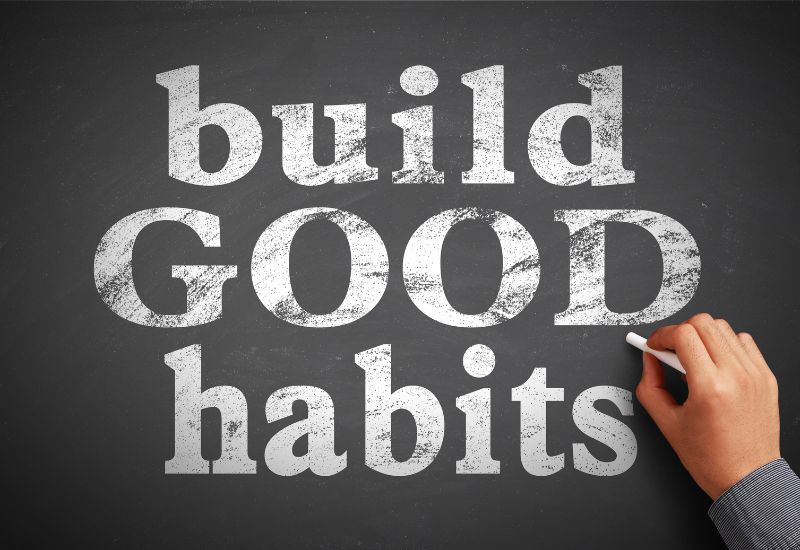In the world of habit-coaching, it’s almost become a cliché to state that “it’s 99% implementation and 1% strategy”. But for so many people, implementation isn’t working — despite their best intentions. Understanding why your habit change isn’t working is the first step to figuring out how to make it work. The road to success is rarely linear, which means you may hit potholes on your way towards a healthier life. It doesn’t matter whether you have one habit or 100; sooner or later, we all have the same problems with implementation. Here are five reasons why your habit change isn’t working and what you can do about it.
1. Something Is Wrong With Your ‘why’
Something is wrong with your why, and the most typical cause is a lack of awareness of why you are trying to change a habit? What purpose does it serve? Are we certain of the benefits of habit change? Is it truly worthwhile?
This might happen when we become overly enthusiastic about changing something, but we’ll probably struggle to stay motivated when things get tough, and we’ll be more likely to give up when things get too difficult and our enthusiasm fades.
Sometimes we overhear someone saying that particular habit has benefited them and then we have this quick thought of “Let me also do this,”. That’s not really resilient motivation that will keep us going in the face of adversity. We unconsciously sense that the rewards and costs of implementing this habit are out of balance, and then we give up without even consciously noticing that this process was going on in the back of our minds.
To avoid this, We can put this habit change to the test to see if it is useful. You can decide if it’s worth it for you; just because it’s good for other people doesn’t mean it’s good for you.
It’s a good idea to tell yourself that you’re going to do something for one month or some other period of time so that you can really feel the benefits and potentially uncover them. So, rather than committing to changing a habit for the rest of your life that you may have never tried before, commit to one month. It’s far simpler to encourage yourself to keep something up for one month than it is to keep anything up for the rest of your life, and then after that month is done, you can assess whether it was worthwhile for you and whether you want to continue with this for a longer period of time.
When we have decided that something we want to change and we also access the benefit of this change, We need to keep ourselves aware consciously of the advantages of this habit change. Because the benefits of habit change can often be lost in daily life, you could write them down.
We might keep in touch with people who have changed their habits in a similar way and are reaping the same benefits.
We could read books and get motivated on why this is a beneficial habit, We can stay in touch with the benefits of this habit change even after implemented it and done it for a long time, and there’s no doubt about whether it’s worth it, and it doesn’t even cross your mind as a possible reason to quit the habit.

2. You Don’t Have The Right Mindset
When we first begin a new habit, we frequently approach it with the thought that “I’m going to have to force myself to do this,” and we then enter a mode or mindset of “powering through it.” This thought process can cause us to overlook some aspects of the habit that we could actually approach in a different way that would make it much more enjoyable and easier to stick with.
For instance, eating healthy food doesn’t require that you consume tasteless food. It’s important to learn how to prepare healthy meals while exercising, which need not be unpleasant or boring. Perhaps you could go outside and enjoy nature, or perhaps you could listen to an audiobook to keep your mind occupied.
Similarly, waking up early doesn’t necessarily imply you’ll feel exhausted all day. It simply involves getting to bed earlier, so be careful not to neglect opportunities to make the situation more comfortable and enjoyable. The easier you can make it to do, the more likely you are to stick with this new habit.
3. You’re Trying to Change Too Much at Once
If you try to change ten different habits at the same time, or too much at once, you will most likely fail at all of them. The problem here is that we are being overly ambitious, and the solution is not to sacrifice your long-term, bigger goal, but to chunk down your habit changes so that each one is manageable enough to achieve.
If we try to make too many changes at once, we may become overwhelmed. This can make it difficult to stay motivated and work toward your goals.
If you try to change too much of a thing at once, you may set ourselves up for failure and develop the self-concept “I’m someone who can’t change whenever I try it.” If It didn’t work, you should truly protect your own belief in yourself that you can change by taking small steps. If you feel that you’ve never been able to change much, don’t let your past define you. It is never too late to begin over.
Related – 30 Habit Change Quotes to Transform Your Life and Achieve Your Goals
Consider the following example. Assume you want to improve your physical activity. Instead of creating a complicated workout schedule, or even simply telling yourself that you want to exercise multiple times per week, start with once per week. That may not seem like much, but when compared to not exercising, it’s a significant improvement. We sometimes underestimate the importance of small positive steps because we believe that if I’m not going to do some complicated plan of different types of exercise at different times of the day every single day, then I might not do it at all, and this type of black-and-white thinking is not helpful. If we think about it, someone who exercises once a week will have exercised 52 times more at the end of the year than someone who does not exercise at all, so choose small steps once these small steps have become a very stable habit
4. You’re Trying an Ineffective Way to Deal With Challenges and Setback
Every new habit change is going to be challenging, and there will be situations in which it is going to be harder than in other situations. Most people will tell you that the key to habit change is willpower and sheer force of will. But while that may be true, it’s not an effective way to make a habit change stick. If you try to force your habit to change, it’s more likely that you’ll fail. If you try to change too much at once, try to change the wrong habits, or try to use ineffective ways to deal with challenges and setbacks, you’re more likely to fail. And if you do fail, you’re less likely to try again.
What we can do to support the habit change is to be prepared for these situations, to deliberately consider when it will be difficult to maintain this, and then to do everything to make it easy in those situations. Perhaps we can inform people about our habit change so that they don’t have unrealistic expectations that we won’t be able to meet.
When there is a time constraint, we may consider rescheduling the day of our new habit to another day, or we may decide to prepare something else in advance that will make it simpler for us to stick our new habit.
If you change your diet and want to eat out with friends, you can check the restaurant’s website to see what on their menu supports your diet so you can go there knowing what you can have and you don’t have to look at everything on the menu that you would rather not eat, so be prepared for challenges.
If you’re going to make exceptions, or if there are suggested days when it won’t happen, prepare them carefully. Don’t give in to the exception on the spur of the moment since these kinds of exceptions accumulate, and the new habit may be gradually lost.
Another important thing in habit change is that if anything does go wrong, whether you give in to something or don’t follow through on something you planned to achieve, you should treat yourself with compassion over time. If you punish yourself for not following through on your new habit, it will just make things worse. It will decrease your motivation and may even push you back into your old behaviours. The essential point is to be self-compassionate and understand that challenges are part of the process and that criticizing yourself will not help.
5. You Haven’t Built the Right Environment for Success
When attempting to break a habit, you must carefully consider what you want to change. You must set reminders so that you are aware of this habit change throughout the day. You must also eliminate everything that is not favourable to this habit change, including your environment.
We can show how the environment influences habit change. When the American soldiers returned home at the end of the Vietnam War, many of them had developed a heroin addiction in Vietnam. It was a major concern how the government would support these men in breaking up this newly acquired habit, which was extremely harmful to American soldiers. Surprisingly, the majority of these individuals quit using heroin entirely by changing their environment. They stopped doing this because they were back at home. There may have been a lot of circumstances that made it difficult for them to maintain this habit—they weren’t bored, they didn’t have a dealer, the heroin was more expensive—all of these things could have made it difficult for them to maintain this habit. They stopped simply because their context and environment had changed.
If you wish to alter a habit, you should not necessarily relocate to another nation, but rather consider “how I may change my environment in such a way that it will be most supportive of this habit change”. Assume you want to quit eating a certain sort of food; create a context and environment that make it difficult for you to access this type of food. A successful habit change does not entail being tough in the face of temptation; rather, it entails adjusting your setting and environment so that temptation does not tempt you in the first place. So throw the junk out of your apartment; don’t go into the isle of the store where this specific item is being sold; maybe you even want to change your route to or from work so that it doesn’t take you by this shop that tempts you; and think about how you can change your environment in context to support your new habit.
A Word From BeyondPsychub
Making a habit change is hard work but it’s worth it. It can seem like an impossible task, but it’s something that anyone can do. All it takes is knowing why you’re trying to make the change, knowing what type of change you’re trying to make, and having the right mindset, tools, and environment to support your success.















